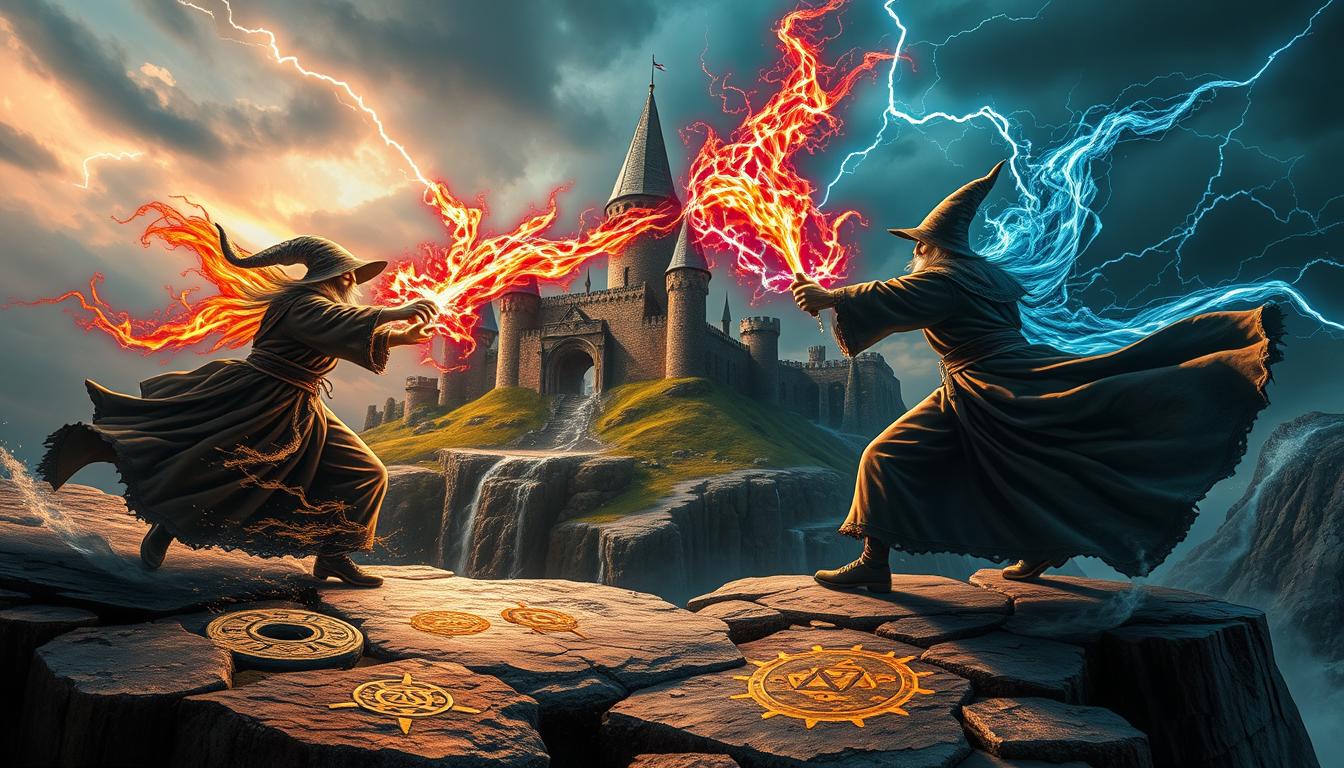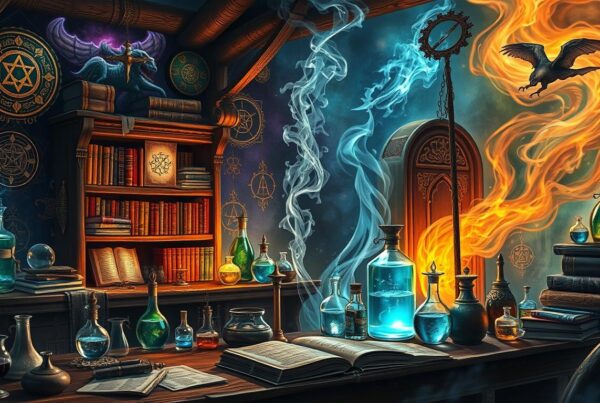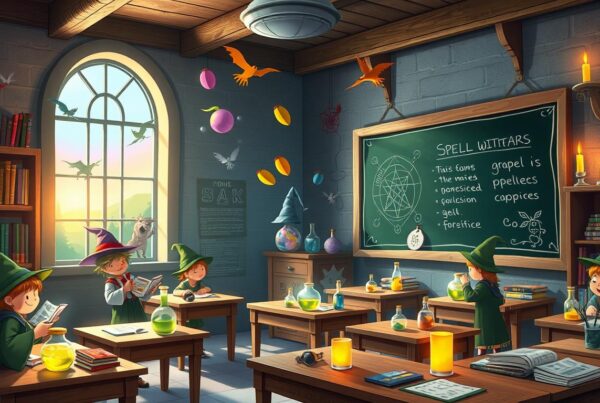Wizard duels are a captivating and integral part of wizarding culture, where two or more skilled wizards or witches engage in magical combat to demonstrate their prowess and resolve conflicts. These formal dueling practices have a rich history, with various techniques, strategies, and famous battles that have shaped the wizarding world. From the legendary duel between Albus Dumbledore and Gellert Grindelwald in 1945 to the intense clashes during the Second Wizarding War, wizard duels have played a crucial role in determining the fate of the magical community.
Dueling in the wizarding world shares similarities with Muggle fencing, but with the added complexity and power of magical spells. Dueling techniques involve a combination of offensive and defensive spells, non-verbal magic, and quick reflexes. The objective is to disarm, stun, injure, or defeat the opponent, forcing them to submit. Throughout dueling history, various strategies have been employed, such as the use of powerful curses, clever feints, and psychological tactics to gain an advantage over the adversary.
Famous wizard duels have become legendary, showcasing the incredible skill and determination of the combatants. The duel between Dumbledore and Voldemort in the Ministry Atrium during the Second Wizarding War was a spectacular display of advanced magic, with both wizards pushing the boundaries of their abilities. Other notable duels include the one between Severus Snape and Gilderoy Lockhart in the Hogwarts Dueling Club, and the intense battle between Molly Weasley and Bellatrix Lestrange during the Battle of Hogwarts.
Key Takeaways
- Wizard duels are formal magical combats between skilled wizards or witches
- Dueling techniques involve offensive and defensive spells, non-verbal magic, and quick reflexes
- Famous wizard duels, such as Dumbledore vs. Grindelwald and Dumbledore vs. Voldemort, have shaped wizarding history
- Dueling strategies include powerful curses, feints, and psychological tactics
- Notable duels showcase the incredible skill and determination of the combatants
The Art of Wizard Duelling
Wizard duelling is a time-honored tradition that combines skill, strategy, and a deep understanding of magical techniques. To excel in this art, aspiring duelists must familiarize themselves with the rules, etiquette, and strategies that define successful duelling.
Rules and Etiquette of Wizard Duels
Wizard dueling rules dictate that opponents must bow to one another before engaging in combat, demonstrating respect and sportsmanship. Duels are strictly limited to magical means, with physical contact strictly prohibited. Duelists are expected to adhere to a code of conduct that emphasizes fair play and honor.
Techniques and Strategies for Success
Mastering dueling techniques is essential for success in wizard duels. Non-verbal spells are often employed for their speed and element of surprise, though incantations spoken aloud are preferred when time allows. The Shield Charm is a fundamental defensive spell, while offensive spells like Stunning Spells, the Impediment Jinx, and the Full Body-Bind Curse are commonly used to gain the upper hand. Effective dueling strategies involve a balance of offensive and defensive maneuvers, as well as the ability to anticipate and counter an opponent’s moves.
| Spell | Incantation | Effect |
|---|---|---|
| Shield Charm | Protego | Creates a magical barrier to deflect spells |
| Stunning Spell | Stupefy | Renders the target unconscious |
| Impediment Jinx | Impedimenta | Slows down or stops the target’s movement |
| Full Body-Bind Curse | Petrificus Totalus | Paralyzes the target’s entire body |
The Role of Seconds in Wizard Duels
Seconds play a crucial role in wizard duels, serving as trusted allies who can step in as replacements if necessary. They also act as witnesses to ensure that dueling etiquette is followed and that the duel is conducted fairly. In some cases, seconds may attempt to negotiate a peaceful resolution before the duel begins, though this is not always possible given the high stakes and intense emotions often involved in these conflicts.
“The art of duelling is not just about raw power, but also about finesse, strategy, and the ability to think on one’s feet.” – Filius Flitwick, Hogwarts Charms Master
By understanding the intricacies of wizard dueling rules, mastering essential techniques, and developing effective strategies, aspiring duelists can hone their skills and rise to the top of this fascinating and challenging magical art form.
History of Wizard Duelling
The history of wizard duels is as fascinating as it is long, with the origins of dueling dating back centuries. As the art of magical combat evolved, so too did the techniques and strategies employed by witches and wizards seeking to prove their skills and settle disputes.
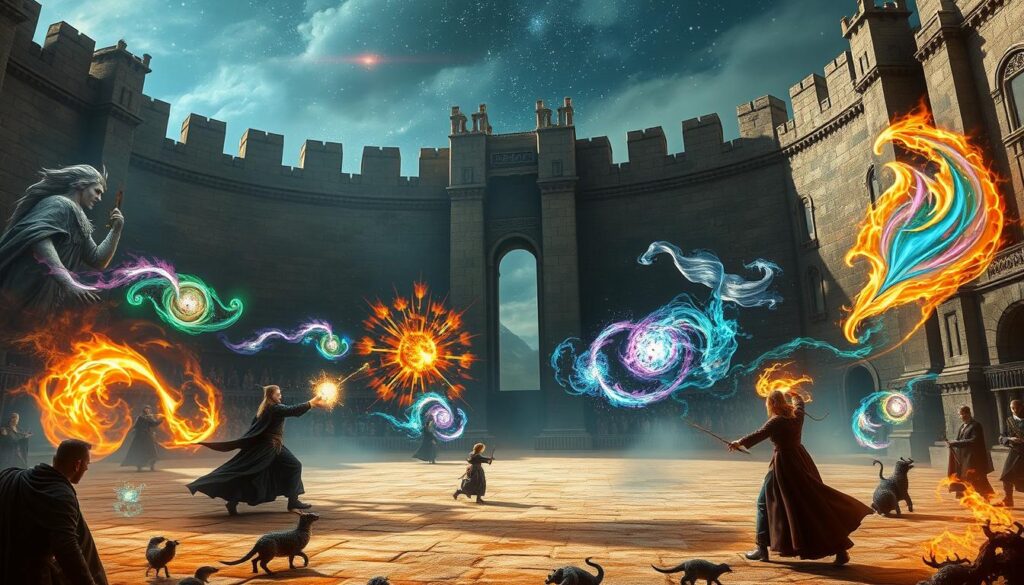
Origins and Evolution of Wizard Duels
The earliest recorded wizard duels can be traced back to medieval times, when magical folk would engage in ritualized combat to defend their honor or resolve conflicts. These early duels were often informal affairs, with few set rules and a wide range of spells and charms being employed. As time passed, however, the practice of dueling became more codified, with specific guidelines and etiquette being established to ensure fair play and prevent undue harm.
One notable example of the evolution of dueling can be seen in the development of the Disarming Charm, or Expelliarmus. This spell, which causes an opponent’s wand to fly out of their hand, was invented by Elizabeth Smudgling in 1379 and quickly became a staple of wizard duels due to its effectiveness and relative safety.
Duelling Clubs and Competitions Throughout History
As the popularity of wizard duels grew, so too did the number of organized clubs and competitions dedicated to the art. Perhaps the most famous of these was the Duelling Club at Hogwarts, which was established by Professor Gilderoy Lockhart during the 1992-1993 school year. Though short-lived, the club provided students with valuable training in magical combat and helped to prepare them for the dark times that lay ahead.
Other notable dueling competitions throughout history include:
- The Supreme Dueller Contest of 1379, won by Elizabeth Smudgling
- The All-England Wizarding Duelling Competition, held annually since 1544
- The International Wizard Duelling Championship, first held in 1692
Notable Duelists in Wizarding History
Throughout the history of wizard duels, there have been many skilled and renowned duelists who have left their mark on the art. Some of the most notable include:
| Duelist | Era | Notable Achievements |
|---|---|---|
| Elizabeth Smudgling | 14th century | Inventor of the Disarming Charm, winner of the 1379 Supreme Dueller Contest |
| Filius Flitwick | 20th century | Charms Master at Hogwarts, rumored to be a dueling champion |
| Albus Dumbledore | 20th century | Defeated the dark wizard Gellert Grindelwald in a legendary duel in 1945 |
“The art of dueling is as much about the mind as it is the wand. A true master must be quick of thought and steady of hand, ready to adapt to any situation.” – Filius Flitwick
These notable duelists and the many others who have practiced the art throughout history have helped to shape the evolution of dueling and ensure its enduring legacy in the wizarding world.
Wizard Duels: Techniques, History, and Famous Battles
Wizard duels have been a captivating aspect of magical society for centuries, showcasing the incredible skill and power of the wizarding world’s most talented duelists. Throughout history, various dueling techniques and strategies have been employed by wizards and witches to gain the upper hand in these intense magical battles.
One of the most renowned wizard duels in history took place in 1945 between Albus Dumbledore and Gellert Grindelwald. This legendary battle marked a turning point in the wizarding world, with Dumbledore emerging victorious using his exceptional dueling skills and powerful magic. Another famous duel occurred during the Battle of the Department of Mysteries, where Dumbledore faced off against Lord Voldemort in a spectacular display of magical prowess.
“To a well-organized mind, death is but the next great adventure.” – Albus Dumbledore
Aspiring duelists often study the techniques and strategies used by famous wizards to improve their own skills. Some of the most effective dueling techniques include:
- Mastering non-verbal spells to catch opponents off guard
- Employing creative combinations of offensive and defensive spells
- Developing quick reflexes and agility to dodge incoming attacks
- Maintaining mental focus and discipline throughout the duel
| Duelist | Year | Winning Spell |
|---|---|---|
| Alberta Toothill | 1430 | Blasting Charm |
| Elizabeth Smudgling | 1379 | Disarming Charm (original) |
Throughout wizard dueling history, various competitions and clubs have emerged to celebrate this ancient art. The All-England Wizarding Duelling Competition, for example, has been a prestigious event since the 15th century, attracting the most talented duelists from across the country. In 1430, Alberta Toothill made history by winning the competition using a powerful Blasting Charm against the favored contender, Samson Wiblin.
As the wizarding world continues to evolve, so too do the dueling techniques and strategies employed by modern-day wizards. However, the rich history and timeless allure of wizard duels remain a testament to the incredible skill, courage, and magical prowess of those who have participated in these legendary dueling battles throughout the ages.
Famous Duels in Wizarding History
Throughout the rich tapestry of wizarding history, several famous wizard duels have captured the imagination and left an indelible mark on the magical community. These epic confrontations showcase the incredible skill, bravery, and determination of the witches and wizards involved, forever etching their names in the annals of history.
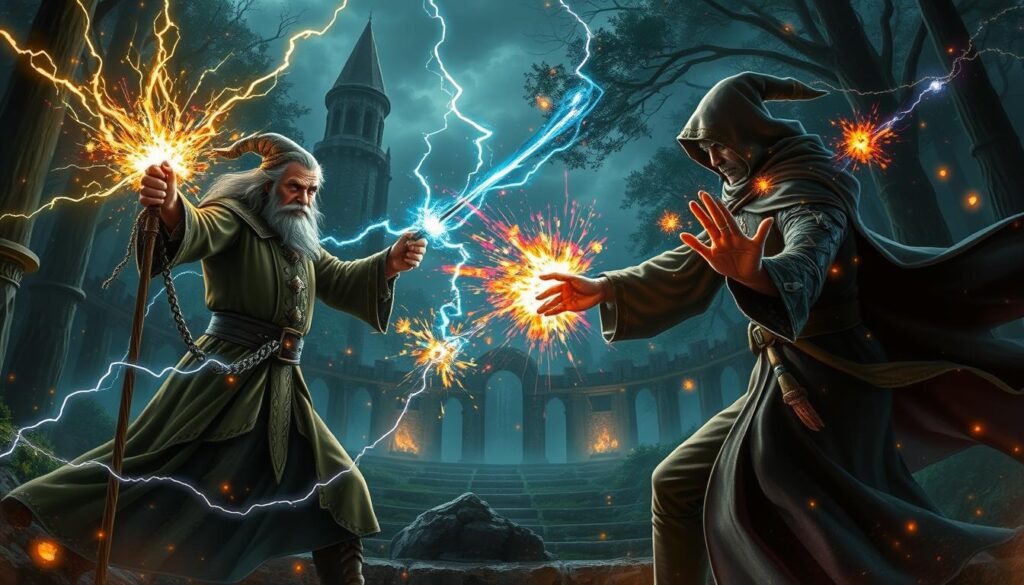
Albus Dumbledore vs. Gellert Grindelwald
One of the most legendary duels in wizarding history took place in 1945 between Albus Dumbledore and Gellert Grindelwald. The two powerful wizards, once close friends, found themselves on opposite sides of a global conflict. Grindelwald, driven by his belief in wizarding supremacy, had amassed a formidable army and threatened to plunge the world into darkness. Dumbledore, recognizing the grave danger posed by his former friend, stepped forward to challenge him in a duel that would decide the fate of the wizarding world.
The Dumbledore vs. Grindelwald duel was a display of extraordinary magical prowess, with both wizards employing a vast array of spells and strategies. In the end, Dumbledore emerged victorious, cementing his status as one of the greatest wizards of all time and putting an end to Grindelwald’s reign of terror.
Harry Potter vs. Lord Voldemort
Another famous duel that has captured the hearts and minds of witches and wizards everywhere is the epic confrontation between Harry Potter and Lord Voldemort. The two wizards, linked by a prophesy and a tragic past, clashed on numerous occasions throughout Harry’s years at Hogwarts. However, it was their final duel during the Battle of Hogwarts that would determine the fate of the wizarding world.
In a display of incredible courage and skill, Harry Potter faced off against the most powerful dark wizard of all time. Despite Voldemort’s vast arsenal of dark magic and his army of Death Eaters, Harry remained steadfast in his resolve. With the help of his friends and allies, Harry ultimately defeated Voldemort, bringing an end to his reign of terror and restoring peace to the wizarding world.
Severus Snape vs. Gilderoy Lockhart
While not as world-altering as the previous duels, the confrontation between Severus Snape and Gilderoy Lockhart during the first meeting of the Duelling Club in 1992 remains a memorable moment in Hogwarts history. Lockhart, the new Defense Against the Dark Arts professor, had proposed the club as a way to teach students how to defend themselves. Snape, ever the skeptic, challenged Lockhart to a demonstration duel.
The Snape vs. Lockhart duel was brief but humiliating for the latter. With a swift flick of his wand and a well-timed “Expelliarmus,” Snape easily disarmed Lockhart, sending his wand flying and exposing him as the fraud he truly was. This duel, while not as consequential as others, served to highlight the importance of true skill and knowledge in the art of duelling.
| Duel | Winner | Loser | Year | Significance |
|---|---|---|---|---|
| Albus Dumbledore vs. Gellert Grindelwald | Albus Dumbledore | Gellert Grindelwald | 1945 | Ended Grindelwald’s reign of terror |
| Harry Potter vs. Lord Voldemort | Harry Potter | Lord Voldemort | 1998 | Defeated the most powerful dark wizard of all time |
| Severus Snape vs. Gilderoy Lockhart | Severus Snape | Gilderoy Lockhart | 1992 | Exposed Lockhart as a fraud |
The Importance of Duelling Skills in Wizarding Society
In the wizarding world, dueling skills are held in high regard, as they play a crucial role in both friendly competitions and life-or-death situations. The ability to effectively use offensive and defensive spells, as well as non-verbal magic, can give a witch or wizard a significant advantage in a duel. Duelling prowess is also seen as a mark of honor and bravery within wizarding society.
Many students at Hogwarts School of Witchcraft and Wizardry participate in duelling clubs or receive training to hone their skills. These clubs, such as the Regular Duelling Club, offer opportunities for students to practice and compete against each other. The entry cost for duels at the Regular Duelling Club ranges from 50 coins for the first two duels to 500 coins at Year 6, with a 7-hour refresh rate between duels or the option to pay Gems to play again.
Duelling Club Events are another way for students to showcase their skills and earn rewards. Each duel at these events costs 1 Ticket, except for the last duel before each milestone, which costs 2 Tickets. Winning a duel at the Duelling Club Events rewards players with 100 coins, making it an attractive opportunity for those looking to improve their dueling abilities and earn some extra currency.
| Spell Effect | Examples |
|---|---|
| Damage | Flipendo, Incendio |
| Stunning | Stupefy, Petrificus Totalus |
| Healing | Episkey, Vulnera Sanentur |
| Stamina Reduction | Bombarda, Diffindo |
The mechanics of dueling in the wizarding world are intricate, with various spells having different effects, attribute requirements, and additional consequences. Offensive spells can cause direct damage, stun opponents, or reduce their stamina over time. Defensive stances allow players to heal themselves and use healing spells and potions, in addition to some damaging spells. The strategy involved in choosing the right spells and managing stamina points adds depth to the importance of dueling skills in wizarding society.
The significance of dueling in the wizarding world cannot be overstated. It is a skill that not only proves one’s magical prowess but also their bravery and quick-thinking in the face of danger.
In conclusion, dueling skills are an integral part of wizarding society, with their importance extending beyond mere competition. They serve as a testament to a witch or wizard’s magical abilities, courage, and strategic thinking, making them a highly valued asset in the magical community.
Duelling Spells and Their Applications
In the world of wizard duels, a wide array of spells come into play, each serving a unique purpose. From offensive spells designed to overpower an opponent to defensive spells meant to protect the caster, the choice of dueling spells can significantly impact the outcome of a duel. Moreover, the mastery of non-verbal spells can give a duelist a crucial advantage, allowing them to cast quickly and without warning.
Offensive Spells for Wizard Duels
Offensive spells are the backbone of any successful dueling strategy. These spells are designed to directly attack an opponent, causing damage or limiting their ability to fight back. Some notable offensive spells include:
- Stupefy: A commonly used spell that knocks the target unconscious and can stop moving objects.
- Expelliarmus: The Disarming Charm, which forces an opponent to drop their wand.
- Impedimenta: The Impediment Jinx, which slows down or stops an attacker.
Defensive Spells and Countermeasures
Equally important in wizard duels are defensive spells, which protect the caster and limit their opponent’s ability to cause harm. Some key defensive spells include:
- Protego: The Shield Charm, which creates a magical barrier to deflect spells and physical objects.
- Expecto Patronum: The Patronus Charm, which can shield against Dementors and deliver messages.
- Finite Incantatem: A general counter-spell that terminates ongoing spell effects.
Non-Verbal Spells in Duelling
Non-verbal spells are a mark of advanced magical skill and can provide a significant advantage in duels. By casting spells without uttering an incantation, a duelist can catch their opponent off guard and cast more rapidly. Some of the most powerful wizards, such as Albus Dumbledore and Lord Voldemort, were known for their mastery of non-verbal magic.
“Your adversary has no warning about what kind of magic you’re about to perform, which gives you a split-second advantage.”
– Severus Snape, on non-verbal spells
| Spell | Type | Occurrence Rate | Notable Use |
|---|---|---|---|
| Accio | Charm | Common | Used by Harry Potter to retrieve his broomstick |
| Age Line | Enchantment | Advanced | Used by Albus Dumbledore to prevent underage students from entering the Triwizard Tournament |
| Aguamenti | Charm | Moderate | Used by Harry Potter to extinguish fire during the Horcrux hunt |
| Anapneo | Spell | Rare | Used by Professor Slughorn to save Marcus Belby from choking |
By combining offensive, defensive, and non-verbal spells, duelists can create a well-rounded strategy that keeps their opponents guessing and increases their chances of victory. As the wizarding world continues to evolve, so too will the array of dueling spells and their applications in magical combat.
Training and Preparation for Wizard Duels
To become a skilled duelist in the wizarding world, one must undergo rigorous training and preparation. This involves developing both mental and physical discipline, as well as practicing and honing dueling skills. Aspiring duelists can benefit from studying the techniques and strategies employed by successful duelists throughout history, such as those who participated in the First Wizarding War.
Developing Mental and Physical Discipline
Mental discipline is crucial in wizard duels, as it allows duelists to maintain focus, control their emotions, and quickly analyze their opponent’s moves. Techniques such as meditation, visualization, and occlumency can help develop mental fortitude and clarity under pressure. Physical discipline is equally important, as proper form, footwork, and wand control can give a duelist an edge in battle.
Some notable organizations that emphasize mental and physical discipline in dueling include:
- The Order of the Ethereal Blade in Aundair, which focuses on the study and development of war magic while emphasizing discipline and skill.
- The Gilded Labyrinth in Thrane, which specializes in merging divine energy with arcane spells, requiring a high level of mental and physical control.
Practicing and Honing Dueling Skills
Regular practice is essential for mastering the art of dueling. Aspiring duelists should dedicate time to rehearsing spells, engaging in mock duels, and studying various techniques and strategies. Joining a dueling club or seeking mentorship from experienced duelists can provide valuable opportunities for growth and improvement.
“Dueling is not just about raw power, but also about finesse, strategy, and adaptability. A skilled duelist must be able to think on their feet and adjust their approach as the situation demands.” – Filius Flitwick, Hogwarts Professor and Dueling Champion
Some renowned organizations known for their expertise in dueling skills include:
| Organization | Area of Expertise |
|---|---|
| The Guild of Moonlight and Whispers (Aundair) | Illusion, enchantment, divination, and fey-related magic |
| The Arcane Order of Aureon (Aundair) | Arcane magic and dueling |
| The Unspoken Word (Aundair) | Mastering powers of dragons, overlords, and daelkyr |
By dedicating themselves to training for wizard duels, developing mental and physical discipline, and practicing dueling skills, aspiring duelists can improve their chances of success in magical combat. Whether facing off against dark wizards or competing in friendly tournaments, a well-prepared duelist is a force to be reckoned with.
Muggle Duelling vs. Wizard Duelling
In the wizarding world, Muggle dueling is considered a dishonorable and unscrupulous form of combat, typically practiced by inexperienced or impulsive wizards. Unlike wizard dueling, which relies solely on magical means, Muggle dueling involves physical attacks such as punching, kicking, or tackling. In extreme cases, Muggle duels may even involve the use of weapons like knives, swords, or firearms.
Differences in Techniques and Rules
Wizard dueling follows strict rules and customs, with combatants limited to using only magical spells to disarm, stun, injure, or defeat their opponents. In contrast, Muggle dueling has few, if any, rules and often devolves into a brawl-like scenario. While some elements of Muggle dueling, such as physical contact, have been incorporated into magical duels by certain individuals, like Sirius Black ramming Antonin Dolohov with his shoulder, these tactics are generally frowned upon in formal wizard duels.
Historical Examples of Muggle and Wizard Duels
Prior to the implementation of the International Statute of Wizarding Secrecy, some wizards, like Godric Gryffindor, engaged in both Muggle and wizard dueling. Gryffindor was particularly skilled in swordsmanship, a prevalent style of Muggle dueling during the Middle Ages. Throughout history, there have been numerous instances of Muggle dueling in the wizarding world, such as Jacob Kowalski punching Gnarlak, Rudolph Spielman and Abernathy tackling each other during Gellert Grindelwald’s escape, and even students at Hogwarts, like Ronald Weasley and Draco Malfoy, engaging in physical fights. In contrast, famous wizard duels, like those between Albus Dumbledore and Gellert Grindelwald or Harry Potter and Lord Voldemort, showcase the power and skill of magical combat.
While Muggle dueling may be seen as a less sophisticated form of combat in the wizarding world, it has played a role in shaping the history and techniques of magical dueling. Understanding the differences between these two forms of dueling provides insight into the complex and fascinating world of wizarding combat.
